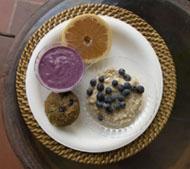 Thanks to years of research and testing, we’ve finally got some useful, amazing information about food. Not only does food provide fuel for our bodies, but certain types actually improve our health and looks.
Thanks to years of research and testing, we’ve finally got some useful, amazing information about food. Not only does food provide fuel for our bodies, but certain types actually improve our health and looks.
With the help of one of my favorite books, “SuperFoods,” by Steven G. Pratt and Kathy Matthews, I’ve put together a guide to make the most of your daily intake. These foods are filled with anti-aging properties, as well as the power to reduce the risk of life-threatening diseases. Take some, leave some, but whatever you do incorporate into your diet will definitely make a difference in both your health and beauty.
Anti-Aging Superfoods
Beans
Beans are a source of low-fat, vitamin-rich protein that helps reduce obesity. Also known as legumes, beans give you the benefits of protein without the risk of certain diseases associated with “animal proteins.” Beans have a high concentration of polyphenols, an extremely beneficial antioxidant with anti-inflammatory, antiallergenic properties. Great choices include lima, black, fava, garbanzo, lentils, cannellini and peas.
Blueberries
Blueberries contain more powerful antioxidants than any other fruit or veggie. Another great source of polyphenols, blueberries are densely packed with salicylic acid, fiber, carotenoids, vitamin E and an array of integral nutrients. Blueberries lower the risk of cardiovascular disease, help maintain urinary tract health and keep our skin looking young and beautiful.
Broccoli
With its high concentration of iron and other important nutrients, broccoli is one of the healthiest foods we can eat. It lowers the risk of cataracts, fights birth defects, supports heart health, and helps builds bones. Countless studies have shown that this leafy veggie also provides significant protection against cancer.
Fish
Fish are loaded with the restorative powers of protein, as well as age-combating omega-3 fatty acids, which fight inflammation, protect against sunburn and keep our skin glowing. Wild Salmon is a top pick, as it lowers the risk of heart disease and really delivers the omega-3s. Other good choices are trout, tuna, Atlantic mackerel, sardines, pacific herring, and most shellfish. Note — don’t overdo it. Government studies urge caution due to the amount of mercury in fish. Keep servings limited to two or three a week, and nix it altogether for young children and women who are pregnant or nursing. Click here for government guidelines.
Nuts and Seeds
Surprisingly, the winner of this category is walnuts! Rich in omega-3s and arginine, an essential amino acid that keeps our blood vessels working smoothly, walnuts reduce the risk of coronary disease, diabetes and cancer. Other excellent choices include almonds, hazelnuts, peanuts and pistachios, as well as watermelon, sunflower and pumpkin seeds. Eat a handful of your favorite or a mix five days a week, if possible.
Oats
Low in calories, oats are high in fiber and protein. A decade ago, the FDA reported an association with eating oats and reduced risk of heart disease. Filled with beta glucan, a fiber that lowers cholesterol and benefits those suffering from type II diabetes, oats slow digestion, which means they keep us full longer. Look for choices such as oatmeal, and whole grain only versions of bread, cereal, crackers, etc. For a super boost, add two tablespoons of flaxseed and wheat germ to your breakfast.
Oranges
Packed with Vitamin C, oranges are proven to help prevent strokes, cancer, and diabetes. Vitamin C is rapidly excreted, so we need to constantly replenish our supply. Oranges are also a good source of folic acid, which prevents cardiovascular disease and is good for our hair. Orange pulp contains 10 times the amount of vitamin C that juice alone does, so be sure to consume the pulp.
Pumpkin
One of the most nutritionally beneficial foods around, pumpkin is an excellent, low-cal source of fiber, potassium, and other disease fighting nutrients. Its high content of carotenoids shields us from free radicals, enhances cellular communication, and protects the skin and eyes from sun damage. In addition, pumpkin helps lower the risk of cancer.
Spinach
Spinach decreases the chance of cardiovascular disease and age-related macular degeneration. It’s packed with vitamin A, which supports skin cell turnover and prevents our skin from getting dry and scaly.
Tomatoes
Tomatoes are rich in lycopene, a natural substance that promotes healthy cells and protects against environmental damage, especially sun exposure-it actually raises the skin’s sun protection factor. Rich in chromium, lutien, potassium, vitamin C and the B vitamins, tomatoes also help the skin retain moisture.
Turkey (skinless breast)
Turkey is low fat, extremely nutritious, and provides beneficial nutrients that build a strong immune system and promote thyroid health, including niacin, selenium, zinc, and various vitamins.
Chaton Anderson is a Writer and the Publicity Director for TheSavvyGal.com. A product and pop culture addict, she is always looking for the coolest, hippest things on the market. Email her at chaton@thesavvygal.com with questions or leads on products and services on the cutting edge.
